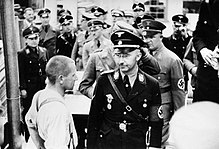
Back زوندربيهاندلونج Arabic Sonderbehandlung German Sonderbehandlung Spanish Sonderbehandlung French טיפול מיוחד HE Sonderbehandlung Italian Sonderbehandlung Polish Tratamento especial Portuguese Särbehandling Swedish 特殊处理 Chinese

Sonderbehandlung (German: [ˈzɔndɐbəˌhandlʊŋ], "special treatment")[1] is any sort of preferential treatment. However, the word Sonderbehandlung was used as a euphemism for mass murder by Nazi functionaries and the SS, who commonly used the abbreviation S.B. in documentation. It first came to prominence during Aktion T4, where SS doctors killed mentally ill and disabled patients between 1939 and 1941, and was one of a number of nonspecific words the Nazis used to document mass murder and genocide. Another notable example was Sonderbehandlung 14f13.
This term was also used to imprecisely refer to the equipment used to perpetrate their crimes, such as gas chambers and Zyklon B. The true meaning of Sonderbehandlung was widely known in the SS, and in April 1943, Reichsführer-SS Heinrich Himmler was so concerned about the security of it that he had it redacted in a secret report.
Berel Lang states that disguised language was used "...not only in communications issued to the Jewish public when the intention of those issuing the communications was to deceive the Jews in order to minimize the likelihood of resistance, but also in addresses to the outside world and, perhaps more significantly, in internal communications as well, among officials who unquestionably knew (who were themselves sometimes responsible for) the linguistic substitutions stipulated by the language rules."[2]
- ^ Lang, Berel (2003). Act and Idea in the Nazi Genocide. Syracuse University Press. ISBN 9780815629931.
- ^ Lang (2003), p. 93
© MMXXIII Rich X Search. We shall prevail. All rights reserved. Rich X Search